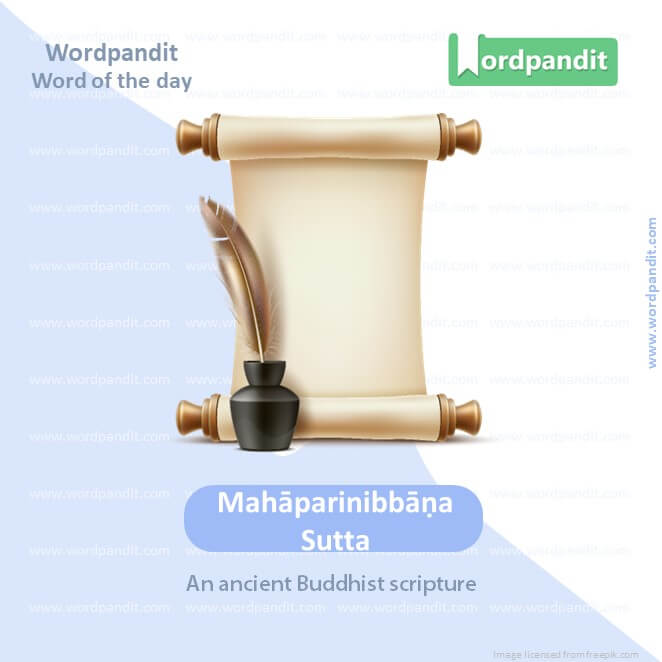Daily Vocabulary Words: List of Daily Used Words
Hi there. Welcome to this special section @ Wordpandit.
Our endeavour here is straightforward: highlighting important daily vocabulary words, you would encounter in The Hindu. This is your repository of commonly used words; essentially, we are posting a list of daily used words. Hence, this has significant practical application as it teaches you words that are commonly used in a leading publication such as The Hindu.
Visit the website daily to learn words from The Hindu.

WORD-1: August
CONTEXT: The festival, held every August, is a spectacle of colors, dance, and music, drawing participants from all over the country.
SOURCE: The Hindu
EXPLANATORY PARAGRAPH: Imagine something that is grand, important, and respected by many people. That’s what “august” means. It’s also a month’s name, but here we’re talking about the other meaning.
MEANING: Respected and impressive (adjective)
PRONUNCIATION: Aw-guhst
SYNONYMS: Dignified, eminent, illustrious, noble, grand
USAGE EXAMPLES:
1. The august presence of the queen was felt by everyone in the room.
2. The building had an august architecture, reminding visitors of its historic significance.
3. He was an august figure in the literary world.
4. The hall was filled with august paintings from the Renaissance period.

WORD-2: Concord
CONTEXT: The concord between the two nations was evident during the joint press conference where both leaders highlighted the shared goals and values.
SOURCE: The Hindu
EXPLANATORY PARAGRAPH: “Concord” is like when you and your friend both want to play the same game. It means agreement or getting along together.
MEANING: Agreement or harmony between people or groups (noun)
PRONUNCIATION: Kon-kord
SYNONYMS: Harmony, agreement, unity, peace, accord
USAGE EXAMPLES:
1. The two countries signed a concord to strengthen their relationship.
2. The team worked in perfect concord to win the match.
3. The concert was a beautiful concord of various musical instruments.
4. They hoped the meeting would bring concord between the rival factions.

WORD-3: Impregnable
CONTEXT: The ancient fortress, perched atop the hill, had always been considered impregnable, having withstood countless sieges throughout history.
SOURCE: The Hindu
EXPLANATORY PARAGRAPH: Think of a super strong castle that no one can get into because its walls are too tough. That castle is “impregnable” – super safe and hard to break into.
MEANING: (of a fortified position) unable to be captured or broken into (adjective)
PRONUNCIATION: Im-preg-nuh-bul
SYNONYMS: Invincible, unassailable, invulnerable, secure, indomitable
USAGE EXAMPLES:
1. The fortress was considered impregnable because of its tall walls.
2. With the new security system, their computer network was impregnable.
3. The castle’s impregnable defenses deterred invaders.
4. Her belief in herself was impregnable, and no one could shake it.

WORD-4: Mahāparinibbāṇa Sutta
CONTEXT: Scholars and monks gathered to discuss the significance of the Mahāparinibbāṇa Sutta and its teachings on the final days of the Buddha.
SOURCE: The Hindu
EXPLANATORY PARAGRAPH: The Mahāparinibbāṇa Sutta is a special story in the teachings of Buddhism. It talks about the last days of the Buddha, his final teachings, and how he passed away. It’s like a special chapter in a book about Buddha’s life.
MEANING: An ancient Buddhist scripture (noun)
PRONUNCIATION: Mah-hah-pari-nib-ba-na Soot-ta
SYNONYMS: Sacred text, scripture, discourse, teaching, sutra
USAGE EXAMPLES:
1. Many monks study the Mahāparinibbāṇa Sutta to understand the final teachings of the Buddha.
2. The Mahāparinibbāṇa Sutta offers insights into the nature of life and death.
3. Scholars often refer to the Mahāparinibbāṇa Sutta for historical contexts of Buddhism.
4. The festival commemorates the events described in the Mahāparinibbāṇa Sutta.

WORD-5: Vajjis
CONTEXT: Historical texts often reference the Vajjis, an ancient confederation of tribal clans, known for their democratic practices during the Buddha’s time.
SOURCE: The Hindu
EXPLANATORY PARAGRAPH: The Vajjis were like a team of ancient groups or families who lived long ago during the time of Buddha. They were known for working together and making decisions together, just like a team would.
MEANING: An Indo-Aryan tribe located in northern India (noun)
PRONUNCIATION: Vah-jeez
SYNONYMS: Tribe, clan, confederation, group, league
USAGE EXAMPLES:
1. The Vajjis practiced democratic decision-making long before modern democracies.
2. Buddha often interacted with the Vajjis during his travels.
3. The teachings of the Vajjis influenced several Buddhist principles.
4. Historical texts provide accounts of Buddha’s discourses with the Vajjis.
WORD-6: Dialectics
CONTEXT: The article delved into the dialectics of modern politics, contrasting it with the philosophical traditions of ancient India.
SOURCE: The Hindu
EXPLANATORY PARAGRAPH: Dialectics is like having a conversation where two people might have different ideas, and they talk about them to find out the truth or a better understanding. It’s like finding the middle ground between two different things.
MEANING: A method of examining and discussing opposing ideas in order to find the truth. (noun)
PRONUNCIATION: Die-uh-lek-tiks
SYNONYMS: Debate, discussion, discourse, reasoning, argument
USAGE EXAMPLES:
1. The philosopher used dialectics to explore complex ideas.
2. The dialectics of the matter led to a deeper understanding of the topic.
3. Dialectics is an essential component of critical thinking.
4. Through dialectics, the two opponents found common ground.
WORD-7: Marginalised
CONTEXT: The seminar focused on the voices of the marginalised communities and the need for their representation in mainstream media.
SOURCE: The Hindu
EXPLANATORY PARAGRAPH: Imagine there’s a group of people who feel left out, like they’re standing on the edge or margin of a big picture. “Marginalised” means that these people aren’t being treated fairly or included properly.
MEANING: Treated as insignificant or on the edge of society. (adjective)
PRONUNCIATION: Mar-ji-nuh-lized
SYNONYMS: Ostracized, sidelined, neglected, overlooked, disregarded
USAGE EXAMPLES:
1. Marginalised communities often face difficulties in accessing basic services.
2. The project aimed at empowering marginalised women in the village.
3. The voice of the marginalised should not be ignored.
4. The policy was criticized for further marginalising certain groups.
WORD-8: Dim
CONTEXT: With the city’s increasing pollution, the once bright stars now appear dim, reminding citizens of the environmental cost of urbanization.
SOURCE: The Hindu
EXPLANATORY PARAGRAPH: Imagine you’re in a room and the light is not very bright, so everything looks a bit dark or faint. That’s what “dim” means. It can also mean something that’s not clear or easy to understand.
MEANING: Not bright or clear, faint. (adjective)
PRONUNCIATION: Dim
SYNONYMS: Dull, faint, murky, shadowy, hazy
USAGE EXAMPLES:
1. The room was dim, lit only by a single candle.
2. As evening approached, the light became dim.
3. His memories of the event were dim and hazy.
4. The pathway was dim, making it hard to navigate.
WORD-9: Santity
CONTEXT: The author, in his novel, created a fictitious world where the essence of ‘santity’ determined the spiritual hierarchy.
SOURCE: The Hindu
EXPLANATORY PARAGRAPH: [Note: “Santity” is not a standard English word. It’s possible that there’s a typographical error or it might be a term specific to a certain context. Based on the closest word “sanity,” the explanation is given.]
Imagine your brain feeling calm, clear, and thinking straight without any confusion. That’s what “sanity” means. It’s about having a sound mind.
MEANING: The ability to think and behave in a normal and rational manner; sound mental health. (noun)
PRONUNCIATION: San-i-ty
SYNONYMS: Soundness, lucidity, rationality, reasonableness, sensibleness
USAGE EXAMPLES:
1. After a hectic day, a walk in the park restored her sanity.
2. Many questioned the sanity of his decision to quit a well-paying job.
3. Meditation helps her maintain her sanity during stressful times.
4. The noise in the city sometimes makes me question my sanity.
WORD-10: Fraught
CONTEXT: The negotiations between the two parties were fraught with tensions, casting doubt over the possibility of a peaceful resolution.
SOURCE: The Hindu
EXPLANATORY PARAGRAPH: Imagine you’re going on a journey, but it’s filled with many problems and challenges. That journey can be called “fraught.” It’s a word we use when something has a lot of worries, dangers, or stress.
MEANING: Filled with something distressing or negative. (adjective)
PRONUNCIATION: Froht
SYNONYMS: Charged, filled, laden, tense, full
USAGE EXAMPLES:
1. The negotiations were fraught with difficulties from the start.
2. Their journey through the jungle was fraught with dangers.
3. The atmosphere in the room was fraught with tension.
4. This year has been fraught with challenges for many businesses.
Vocabulary Exercises
In the language learning fitness regime, ‘vocabulary exercises’ are vital workouts that flex cognitive muscles. These exercises help reinforce new vocabulary, enhance memory, and promote active application. However, to reap the full benefits of ‘vocabulary exercises’, it’s crucial to tackle them with the right strategy and mindset.
To begin with, when approaching ‘vocabulary exercises’, it’s important to view them as opportunities to explore words’ usage. Completing these exercises isn’t simply about ticking off correct answers; it’s about deepening the understanding of the words in various contexts which aids in their active usage.
Leveraging technology can greatly enhance the efficiency of ‘vocabulary exercises’. Digital apps often provide a wide range of ‘vocabulary exercises’ that range from fill-in-the-blank exercises to match-the-column tasks. These digital platforms offer instant feedback and keep you engaged while turning learning into an interactive experience.
Incorporating ‘vocabulary exercises’ in your daily learning routine helps consolidate your vocabulary knowledge. Set aside specific time slots every day to commit to these exercises. Regular revisions steps up retention and keep the learning curve ascending.
Personalizing ‘vocabulary exercises’ also proves beneficial. This could involve creating your own sentences using the learnt vocabulary or drawing visuals that associate with each word. These personalized exercises stimulate more profound learning and enhance the recall ability.
To conclude, ‘vocabulary exercises’ are essential tools in your language learning toolkit. They provide a platform for active learning, promote better recall, and, when paired with technological tools, make learning more engaging and effective. Furthermore, incorporating these exercises into your daily routine and personalizing them heightens their impact. Remember, ‘vocabulary exercises’ are not merely tasks, they are stepping stones guiding you towards your language mastery goals.







